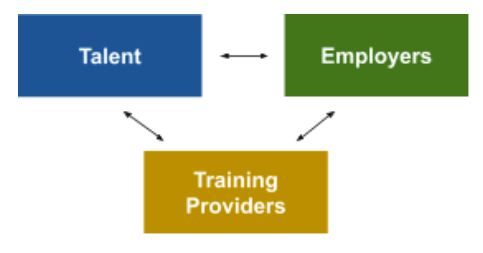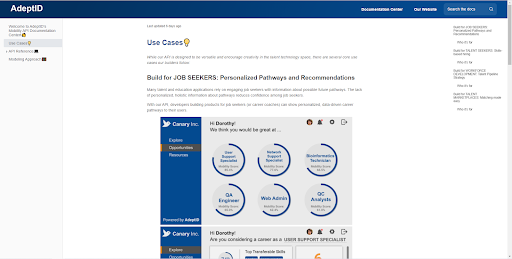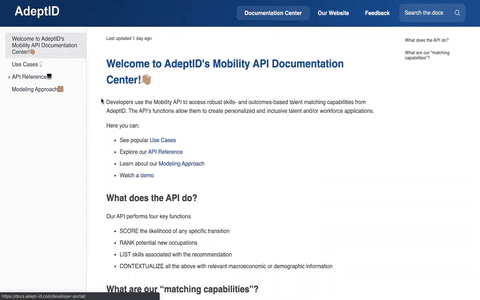Introducing the AdeptID API
We’re thrilled to announce the “launch” of AdeptID’s public API, which is both a big milestone for us (our first “Product”) and an incredibly small step toward where we want to go.
A huge problem…
We started AdeptID last year because we think economic mobility for people without college degrees is unacceptably broken.
Part of this challenge is a matching problem – people with plenty of hidden talent and transferable skills aren’t properly connected to jobs and training where they would have a great impact and expand their opportunities.
Job seekers (“supply”) aren’t the only ones that feel this pain.
Poor matching is an expensive problem for employers (“demand”), vocational training providers, and services across the talent ecosystem (job boards, staffing agencies, lenders, governments) – resulting in over $1.3 trillion of wasted tuition fees and lost annual profit in the US alone.
Many cooks…
This is not a new observation. A growing number of Future of Work companies are joining the employers, educators, and policy-makers already hard at work to fix labor mobility. They are building a variety of software applications to address their parts of the problem in a tech-friendly, scalable way.
But few of these individual applications have the scale or specialist resources to run matching on their own. The space ends up with various walled gardens, none of which have the amount of data to realize the benefits of network effects.
“Talent Matching as a Service”
We don’t think matching should be done in a localized fashion, nor should it require a new full-stack tech solution, hiring a team of PhDs or one-off consulting engagements.
Everyone should have access to the same set of best-in-class tools.
The middle-skilled talent space needs a matching service that learns from all of its players. This service would allow each user to benefit from a much wider perspective than if they were stuck to their own view.
Of course, the service needs to be lightweight and versatile, without insisting on front-end “real estate” of its own, so that it can play nicely with a range of offerings.
AdeptID’s API
We’re launching this API product so that anyone can access our matching capabilities “as a service.”
In the same way anyone building an e-commerce application can confidently turn to Stripe to handle payments, we want builders in the talent ecosystem to turn to us to add cutting-edge ML to their applications in an unobtrusive, cost-effective way.
With a few lines of code, you can now receive predictions and analysis from AdeptID’s recommendation engine, which has brought together multiple skills taxonomies and leverages 100,000s of real observed job transitions.
Because our models are built to serve the segment of the workforce without college degrees, a still nascent user base on most current talent applications, building with our API also means expanding your product reach to new, untapped user segments.
Questions our API can answer
-
“What is the likelihood of an individual getting a new job in a specific new occupation?”
-
“Which skills have the biggest impact on a job seeker’s chances of placement in a given occupation?”
-
“Which other occupations are great new sources of talent for this specific in-demand role?”
-
“What is the potential talent pool (based on skills transferability) for a given in-demand job within a given geography?”
Learn more
We put a ton of work into making our Documentation Center as readable and informative as possible (for developers and n00bs alike).
There, you can:
-
See popular Use Cases
-
Explore our API Reference
-
Learn about our Modeling Approach
-
Watch a demo
Note: The endpoints listed in our public-facing documentation today represent a subset of those available from AdeptID. If you are interested in the full list of endpoints in private use or in development, please contact [email protected].
The long road ahead!
While better matching can, by no means, “fix” job mobility on its own, we’re convinced that our recommendation engine can serve as a transformational enabler if we make it easy to use and we find the right partners. We’re off to a great start with mission-aligned folks like Year Up, Enel, JFF, and others.
We really do want to work with everyone, so please reach out if you have questions, feedback, or ideas for how our product can serve you best.





